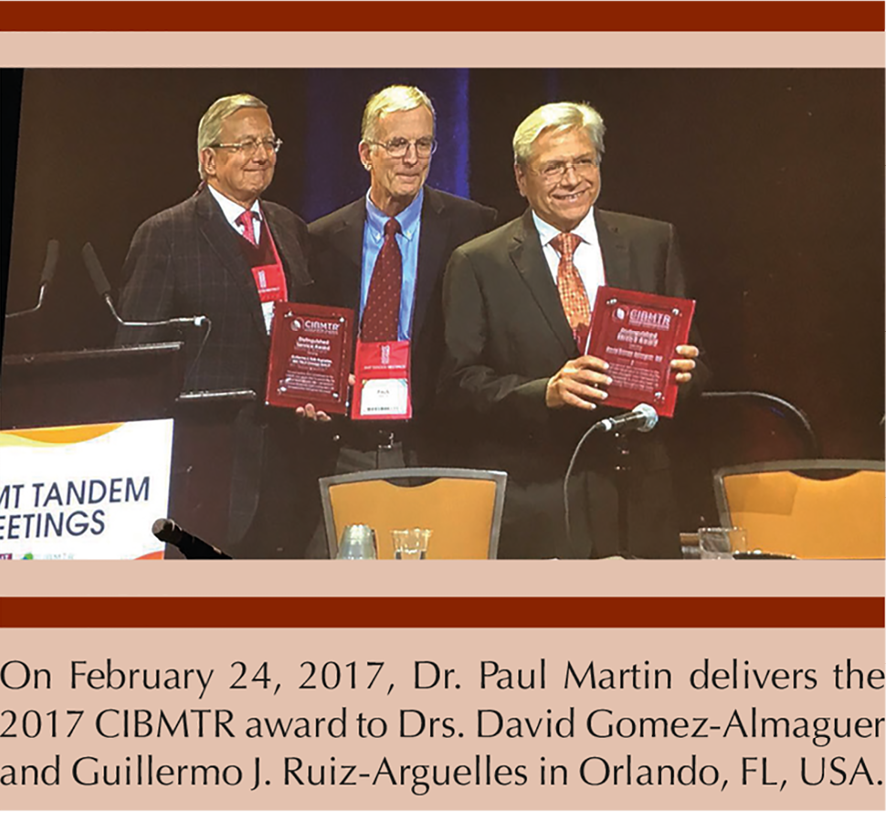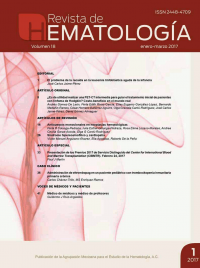Presentación de los Premios 2017 de Servicio Distinguido del Center for International Blood and Marrow Transplantation (CIBMTR). Febrero 24, 2017
Rev Hematol Mex 2017 ene;18(1):33-35.
Martin PJ
Fred Hutchinson Cancer Research Center, Professor of Medicine, University of Washington, Seattle, Washington, USA.
Chair. Center for International Blood and Marrow Transplant Research (CIBMTR).
It is my distinct pleasure to present the 2017 CIBMTR Distinguished Service Award to Dr. Guillermo Ruiz-Arguelles and Dr. David Gomez-Almaguer. As an international organization, the CIBMTR collaborates with the global community to advance hematopoietic cell transplantation therapy and cellular therapy research worldwide. The purpose of the Distinguished Service Award is to recognize individuals who have made outstanding contributions by promoting transplantation research and care in developing countries, by advancing the field despite unique challenges, by expanding the availability of transplantation, by disseminating research results as a way of improving outcomes and quality of life, or by collaborating with organizations to increase data exchange and research collaborations world-wide.
Drs. Ruiz-Arguelles and Gomez-Almaguer have worked together in two different institutions in Mexico. Their partnership has done more to advance the field of stem cell transplantation in Mexico and Latin America than any other investigators in the region. Their early accomplishments were best summarized in a 2005 review titled “The Mexican approach to conduct allogeneic stem cell transplantation: breaking dogma and facing the Matthew effect”, written by Dr. Ruiz-Arguelles.
The broken dogma that high-intensity conditioning regimens were necessary for successful outcomes paved the way for the development of reduced intensity conditioning regimens. In 1999, Drs. Ruiz-Arguelles and Gomez-Almaguer responded to this broken dogma by pioneering an approach that made it possible to implement hematopoietic cell transplantation in developing countries. The review articulated 6 principles behind this approach. First, use the least expensive available medications. The initial regimen used oral busulfan, i.v. cyclophosphamide, i.v. fludarabine, oral cyclosporine and i.v. methotrexate. Second, tailor the number of apheresis sessions to a target CD34 cell dose. Third, eliminate prophylactic administration of ganciclovir and i.v. immunoglobulin. Fourth, use a 7-day/week clinic to minimize the need for hospitalization. Fifth, minimize the use of transfusions. And sixth, use donor lymphocyte infusions only when needed to induce full chimerism or to eliminate malignant cells persisting in the recipient at day 30 after transplantation.
These principles seem self-evident today, but they were far-sighted and perhaps revolutionary at the time. With their implementation, the median cost of transplantation was $18,000 at a time when the cost in the United States was $300,000. In the developed world, we use reduced intensity conditioning regimens as a way to extend hematopoietic cell transplantation to older patients and others who could not tolerate high-intensity regimens because of comorbidity. In the developing world, reduced intensity regimens have been adopted primarily because of their affordability. This approach has now been used for more than 1000 patients in their country.
So much for “breaking dogma”, what about the “Matthew effect”? The Matthew effect refers to a verse in the Gospel of Matthew: “Unto everyone who has shall be given, but from him who has not shall be taken away even that which he has”. Credit in science often goes to the most famous investigator, not necessarily the most deserving one. The review mentioned that the Mexican approach had not escaped the Matthew effect, since this contribution has been frequently overlooked in reviews and reports dealing with hematopoietic cell transplantation. So with this in mind, let’s extend our congratulations to Dr. Ruiz-Arguelles and Dr. Gomez-Almaguer for the 2017 CIBMTR Distinguished Service Award recognizing the highly deserving contributions that they have made to the field.

Response
Guillermo J Ruiz-Arguelles
Centro de Hematología y Medicina Interna. Clínica Ruiz de Puebla, Mexico.
Since my native language is Spanish and we are within an English-speaking audience, I have decided to address you in… Chinese. In the name of both David and myself, in the next minutes, I will try to follow the three golden rules for delivering an address, recommended by Oscar Wilde: 1) Have something to say, 2) Say it and 3) Say nothing else.
The first thing we both have to say is thank you. Thank you for this distinction which clearly is more a commitment than an award. In the words of Frederick Keonig: “We tend to forget that happiness doesn’t come as a result of getting something we don’t have, but rather of recognizing and appreciating what we do have”. And I do recognize many things for which to be thankful. Parents, wife, brothers and sisters, sons, grandchildren, mentors, friends and colleagues, have all contributed to our personal growth and we are very grateful to all of them. Within the BMT community, we are particularly grateful to Sergio Giralt, Robert Peter Gale, Carlos Bachier, Hugo Fernandez, César Freytes, Chuck Le Maistre, Linda Burns, Claudio Anasetti and many others. We are particularly grateful to all those who helped us publishing our work but also to all those who enjoyed rejecting our papers. Along this line, it is noteworthy a note which we received some time ago when submitting a paper: Dear colleagues: I regret to inform you that your paper has been rejected; to save you time and efforts, we are hereby including several slips to let you know that the next five papers that you are intending to submit to this journal have already been rejected.
Gratitude is not only the greatest of virtues, but also the parent of all others. Indeed, we feel much gratitude to all of you.
The second thing that I have to say is that, based on the statements of a well known Mexican lawyer, Armando Fuentes, I am prepared to file a lawsuit against the journal Forbes, since I have been a victim of an unexplainable omission. The journal published the list of the wealthiest individuals in the world and I do not appear in it. In the list there are individuals such as the Sultan of Brunei, the family of Sam Walton and Takichiro Mori, Queen Elizabeth and even two Mexicans: Carlos Slim and Emilio Azcarraga. To my regret, the journal does not mention me, despite the fact that I am a very wealthy individual, these being my credentials: I have my life which I received I do not know why and I have health, which I keep I do not know how. I have a family which includes an adorable wife who by giving me her life, provided me with the best of mine, three wonderful sons who have given me nothing but happiness and six grandchildren with whom I experience a new and joyful fatherhood. I have brothers and sisters who are like my friends, and friends who are like my brothers and sisters. I have people who love me sincerely despite my defects, and people who I love sincerely despite my defects. I have patients who believe in me despite my limitations, and patients whom I try to help despite my limitations. I have several readers who read well the books and papers that I write wrongly. I have a house full of books; my wife would say that I really have a lot of books and between them a house. I own a piece of the world in the shape of a garden. I have two dogs that wait for me at night and greet me as if I were the owner of the sky and the earth. I have eyes that still see, ears that still listen, feet that walk, hands that can provide caresses and a brain that thinks ideas that others had already thought but that I had not thought. I am also the owner of the common inheritance of men: Joys to enjoy and sorrows which brother me to those who suffer. And I have faith in God who provides his infinite love for me. Can someone have more wealth than mine? Why then, Forbes did not include me in its list?
Having said this and honoring the third golden rule, I will say nothing else but thank you. I would thank you from the bottom of my heart, however, for all of you, my heart has no bottom.

